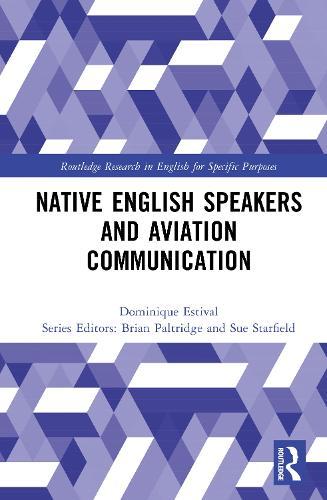Full Product Details
Author: Dominique Estival
Publisher: Taylor & Francis Ltd
Imprint: Routledge
Weight: 0.490kg
ISBN: 9781032443775
ISBN 10: 1032443774
Pages: 164
Publication Date: 30 September 2025
Audience:
College/higher education
,
Professional and scholarly
,
Tertiary & Higher Education
,
Professional & Vocational
Format: Hardback
Publisher's Status: Active
Availability: Not yet available

This item is yet to be released. You can pre-order this item and we will dispatch it to you upon its release.
Reviews
""As a pilot and Aviation English trainer at the world’s largest and oldest flight training school, I’ve seen first-hand how both native and non-native English-speaking pilots benefit equally from structured, technology-driven communication training and assessment. Dr. Estival’s book delivers the evidence the industry needs to ensure communication standards apply to everyone, without exception."" - Andrew Schneider. Assistant Professor, Research Coordinator, Aviation English Coordinator. Flight Training Department, College of Aviation. Embry-Riddle Aeronautical University. Florida, USA. ""The author advocates the urgent need for training and testing tailored specifically for native English speakers in the aeronautical English sector, for the sake of safety. Filled with practical examples, this provocative book underscores the inherent risks that come with assuming proficiency in this very specific context, highlighting how a global community of professionals can benefit from structured aviation communication learning. The chapters are well sequenced and the ideas are connected in a straightforward way, guiding the reader through the current state of regulations across various countries and suggesting innovative training solutions. Drawing on the author's extensive experience, academic research and recent discussions presented at international conferences, the book is an important contribution to the field."" - Patricia Tosqui-Lucks. Aeronautical English Training Supervisor at ICEA - Airspace Control Institute, Brazilian Air Force. Brazil. ""This book provides an authoritative yet easy-to-follow examination of aviation communication, connecting extensive research, much of which by the author herself, with practical applications. It addresses an important and critical gap by drawing attention to how perspectives around the English language plays a role both in policymaking and in general understanding, unveiling misconceptions about the teaching and assessment of this professional language. Given that successful aviation communication requires equal responsibility from both native and non-native English speakers, this book goes a step further by suggesting that all users – rather than language learners – adopt best practices in both teaching and assessment within this specific linguistic setting. This resourceful book offers valuable insights for aviation professionals, language instructors, and safety specialists interested in aviation communication."" - Malila Prado. Assistant Professor of English Language and Literature at BNU-HKBU United International College, China. ""By looking more broadly at the issues around language, communication and safety that take account of both the native speakers and non-native speakers, Estival provides a thorough overview of the key issues at play affecting aeronautical communications. This book is able to effectively link theory and practice related to training, communication and assessment, making it both accessible while based on comprehensive research and best practices. This book provides a comprehensive resource for those involved in aviation operations, regulations, training and assessment."" - Michael Kay. President of ICAEA (INTERNATIONAL CIVIL AVIATION ENGLISH ASSOCIATION). Aviation English Advisor. AEROTHAI - Aeronautical Radio of Thailand. Bangkok, Thailand.
Author Information
Dominique Estival is a researcher at the MARCS Institute, Western Sydney University, Australia, and a flight instructor. She investigates the impact of pilot training and language background on pilots’ ability to follow International Civil Aviation Organisation (ICAO) regulations for radio communication.



